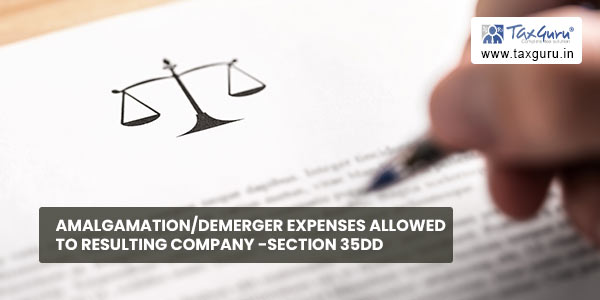In a significant relief for corporates undertaking restructuring exercise, the Delhi High Court in case of Coforge Limited (formerly known as NIIT Technologies Ltd) vs. ACIT: ITA Nos.213- 214/2020 decided on 05.07.2021, while reversing the decision of the Tribunal, held that demerger expenses under section 35DD of the Income Tax Act, 1961 (Ac”) are also allowable to the ‘resulting company’.
BACKGROUND
Pursuant to scheme of arrangement under sections 391-394 of the Companies Act, 1956, certain units from NIIT Ltd. (‘NIIT’) were demerged and vested with the assessee / resulting company [an Indian company incorporated on 13.05.1992] with effect from 01.04.2003 (appointed date).
The assessee/ resulting company incurred legal and professional expenses in assessment year (‘AY’) 2004-05, for the purposes of demerger and claimed deduction of 1/5th thereof, each in 5 consecutive AYs 2004-05 to 2008-09, in terms of section 35DD of the Act.
The claim was allowed in regular assessments completed under section 143(3) of the Act, for the first 3 years, i.e., AYs 2004-05 to 2006-07.
However, in AY 2007-08 (for the first time) and thereafter, in AY 2008-09, the assessing officer (‘AO’) disallowed the deduction, holding that under section 35DD of the Act, deduction is allowable only to the demerged company, viz., NIIT, and not the resulting company, i.e., the assessee. The said findings were confirmed by Commissioner of Income Tax (Appeals) (‘CIT(A)’).
Succinctly put, the case of the Revenue was that the word “assessee” (used in singular) in section 35DD of the Act refers only to company being demerged, i.e., the demerged company (i.e. NIIT) , and does not cover the ‘resulting company’ (i.e. Coforge Limited).
LET’S CONSIDER PROVISIONS OF SECTION 35DD-OF INCOME TAX ACT,1961
Section 35DD of Income Tax Act “Amortisation of expenditure in case of amalgamation or demerger” 35DD.
(1) Where an assessee, being an Indian company, incurs any expenditure, on or after the 1st day of April, 1999, wholly and exclusively for the purposes of amalgamation or demerger of an undertaking, the assessee shall be allowed a deduction of an amount equal to one-fifth of such expenditure for each of the five successive previous years beginning with the previous year in which the amalgamation or demerger takes place.
(2) No deduction shall be allowed in respect of the expenditure mentioned in sub-section (1) under any other provision of this Act.
Note: the Section itself not clear on the allowance of amalgamation/demerger expenses. Whether theses expenses are allowed to demerger company or resulting company.
TRIBUNAL’S FINDINGS
In appeal, the Tribunal, while affirming the disallowance, held that deduction under section 35DD of the Act is allowable only to the parent demerged company and not to the resultant company, i.e., the assessee company.
The reasoning was that in case of demerger, the undertaking(s) which get demerged, may result in new entity and in said circumstances, the resulting company cannot incur expenditure before its birth.
Thus, since demerger of the undertaking(s) took place from the parent company NIIT, the word “assessee” under section 35DD of the Act, refers to NIIT and not the target company, i.e., the assessee, with whom the demerged undertaking got merged.

HON’BLE HIGH COURT OF DELHI FINDINGS ;
The High Court, in its detailed judgment dated 05.07.2021 reversed the aforesaid findings/ conclusions of the Tribunal and held as under:
i. Demerger, a legal device used, very often by assessees to restructure their business operations can take place in different ways, i.e., by way of spin-off OR split-off. The present was a case of spin-off rather than split-off since one of the undertakings of the demerged company, viz., NIIT, was transferred to another existing company, viz., the assessee (Coforge Limited );
ii. Since demerger took place between two existing companies, and that the assessee was already in existence on the date of the demerger, therefore, the finding of Tribunal that the assessee, in this case, was non-existent and came into existence only after the demerger took place, was incorrect;
iii. The word ‘assessee’ in section 35DD of the Act has been carefully used by the Legislature and the same does not only cover the demerged company, but also the resulting company – the interpretation of section 35DD of the Act should align, wherever possible, with how ordinary men of commerce construe such business structuring operations;
iv. Further, the Court accepted the principle of consistency holding that where deduction was allowed for the initial three years of the claim, the same could not have been disallowed in the subsequent remaining years.
CONCLUSION: The ruling of Delhi High Court will be a much needed support to corporate world. This will help smooth restructuring of companies and claiming of restructuring expenses. This ruling reversed earlier proposition that amalgamation/ deserter expenses incurred by amalgamating /resulting company would not be allowed as as deduction at all. Now expenses related to amalgamation/deserter will be allowed in the hand of resulting company.
*****
DISCLAIMER; the case law produced here is only for information and knowledge of readers. The views expressed here are the personal views of the author ans same should not be considered as professional advice.





